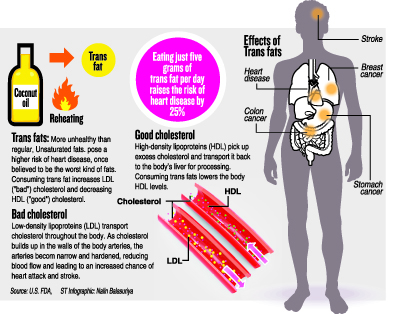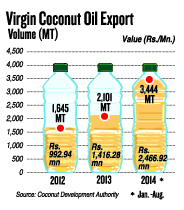News
Virgin coconut oil exports come to a boil
The growing popularity for virgin coconut oil overseas has brought a remarkable rise in exports – but Sri Lankans are yet to recognise its benefits.
Exports in the first seven months of this year brought in close to Rs. 2,500 million, up from Rs. 1,500m in the whole of last year, the Coconut Development Authority said.
“This is a 146 per cent increase compared to last year. There is a demand for Sri Lankan virgin coconut oil from the US, Europe, Japan and South Korea. The trade involving exporting virgin coconut oil from Sri Lanka is thriving,” said the Authority’s Director (Marketing and Research), Arjuna Balasuriya.
He said the oil is not only used in food but also for cosmetic and medicinal purposes.
“Following an Oxford University study that coconut oil might help people with Alzheimer’s, there has been a bigger demand, especially in Europe. Many Europeans are resorting to ayurveda treatment in which virgin coconut oil is used in skin and hair care, and this has added to its demand,” he said.
Virgin coconut oil usually has not been bleached, deodorised, or refined and contains less saturated fat.
It is manufactured from the fresh kernel of the coconut without causing damage to its natural properties and nutrition content. As it has a low level of fatty acid (0.2 per cent maximum) it can be used as medicine, body application in cooking and to manufacture baby oil and other goods, Mr Balasuriya said.
 From January to August this year, 3,444 metric tons (MT) of virgin coconut oil was exported – an increase from 2,101 MT in the whole of last year and from only 1,645 MT exported in 2012.
From January to August this year, 3,444 metric tons (MT) of virgin coconut oil was exported – an increase from 2,101 MT in the whole of last year and from only 1,645 MT exported in 2012.
Despite the demand overseas, Sri Lankans are ignoring the importance of virgin coconut oil. Domestic cooks, small-scale restaurants and food outlets and hotels generally re-use coconut oil or use vegetable and palm oil, putting the health of consumers at risk.
The Health Ministry’s Food Advisory Committee this week instructed Public Health Inspectors (PHIs) to inspect food outlets islandwide and issue severe warnings that action could be taken under the Food Act if they re-heat and re-use oil.
Advertisements by some oil manufacturers even state that their oil can be re-used for cooking, the Secretary to the Committee, Dr. Ananda Jayalal, said.
He condemned such advertising and said PHIs had found food outlets re-using oil over and over again to make fried rice, short eats, pappadums, etc.
“Some of the oil is so old that it looks like engine oil,” he said.
The Director of the Health Ministry’s Nutrition Division, Dr. Senerath Mahamithawa, said reheating and reusing of oil can release cancer-causing chemicals as food additives, particles and seasoning from food cooked previously remain in the oil.
“Toxic aldehydes are released as a result of degradation of the fatty acids caused by reheating cooking oil. These chemicals are carcinogenic,” he said. Reheated oil also resulted in transfats that increase what is termed “bad cholesterol”

